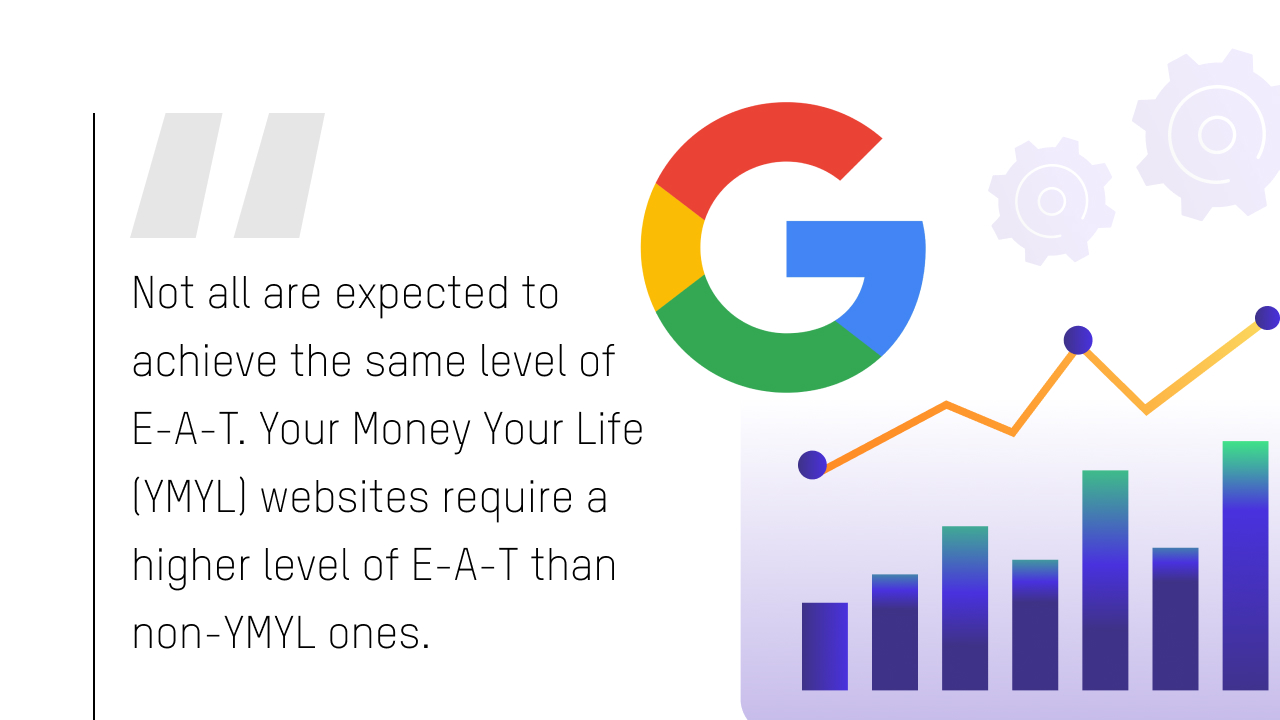Here are some ways to demonstrate a high E-A-T on your website to improve search engine ranking.
E-A-T, which stands for Expertise, Authoritativeness, and Trustworthiness, is a set of guidelines that Google evaluators use to assess the quality level of website content. It was first introduced to the public in 2014 as part of the search engine’s Search Quality Guidelines. While it isn’t considered a ranking factor, it’s important to meet these fundamental guidelines as they can have a big impact on your search result page (SERP) standing.
Ideally, all websites must meet these essential criteria. However, not all are expected to achieve the same level of E-A-T. Your Money Your Life (YMYL) websites require a higher level of E-A-T than non-YMYL ones. YMYL websites touch on critical topics like health, finance, politics, and current affairs. Since they can potentially negatively impact readers’ security and well-being, Google demands a higher level of E-A-T from them.

So what are some strategies to improve your content on these critical websites based on the Google E-A-T?
Build Credible Associations
Make associations with reputable websites. Link to domains that have a high authority score. Associating your website with other credible domains enables Google’s algorithm to verify that the information on your content is indeed factual and well-researched, which can help increase your SERP standing. Furthermore, make sure that your backlinks are natural as Google can detect spammy backlinks and lower your ranking. It’s best to build links organically. This means publishing authoritative content in order to attract natural backlinks that can boost your domain authority and SERP ranking.
Keep Your Content Fresh
To boost your E-A-T, make sure not to let your content go stale. Even your evergreen articles need to be up-to-date. Make sure to audit previous write-ups and identify what needs to be updated. This includes making adjustments to outdated information and figures to maintain the level of accuracy and truthfulness of your content, which is imperative to E-A-T. Moreover, keeping obsolete and erroneous content can only negatively impact your SERP performance.
Focus on a Specific Niche
Concentrate on a particular niche when building content. Creating specialized content can help increase your E-A-T rather than producing generalized content. Google is more likely to see you as an authoritative figure when you home in on a specific sector or subject matter that you’re an expert in. Adopting a more topical approach to content creation will also help you improve your SERP ranking. With your topics narrowed down, you can deliver content tailored to your audience’s needs and searches.
Weed Out Distractions
You might not be aware that the ads on your website can have an effect on your E-A-T. Intrusive pop-ups can be detrimental to your SERP performance as this can impact readers’ trust in your website. Not only that, Google’s algorithm detects distracting placements and sends them to a lower ranking. Make sure your ads are well-timed and non-intrusive so they won’t get in the way of the user experience. Furthermore, make sure that your placements meet Google’s advertising policies. Refrain from placing ads with inappropriate, offensive, and disturbing content as this could decrease your level of E-A-T.
Highlight Author Credentials
Build an author page that showcases the extensive knowledge of the content’s author. Make sure to mention the background, accomplishments, certifications, and other credentials that prove his or her expertise on the subject matter. The goal is to paint the author as a credible source of information to harness audience trust. You can also feature the author’s social media profiles to redirect readers to more supporting information or recommend other published content to allow for recirculation within the website.
Introduce Industry Experience
Introduce your area of expertise through a detailed About Page. Prove to your audience why you’re qualified to write about your chosen subject matter, putting an emphasis on your experience and industry knowledge. Showcase your certifications, accreditations, and other distinctions that can enhance your credibility to readers. While webpages like this are less likely to rank, they can be read by Google’s algorithm and determine your level of expertise, so it’s important to beef up your About Page with necessary information.



